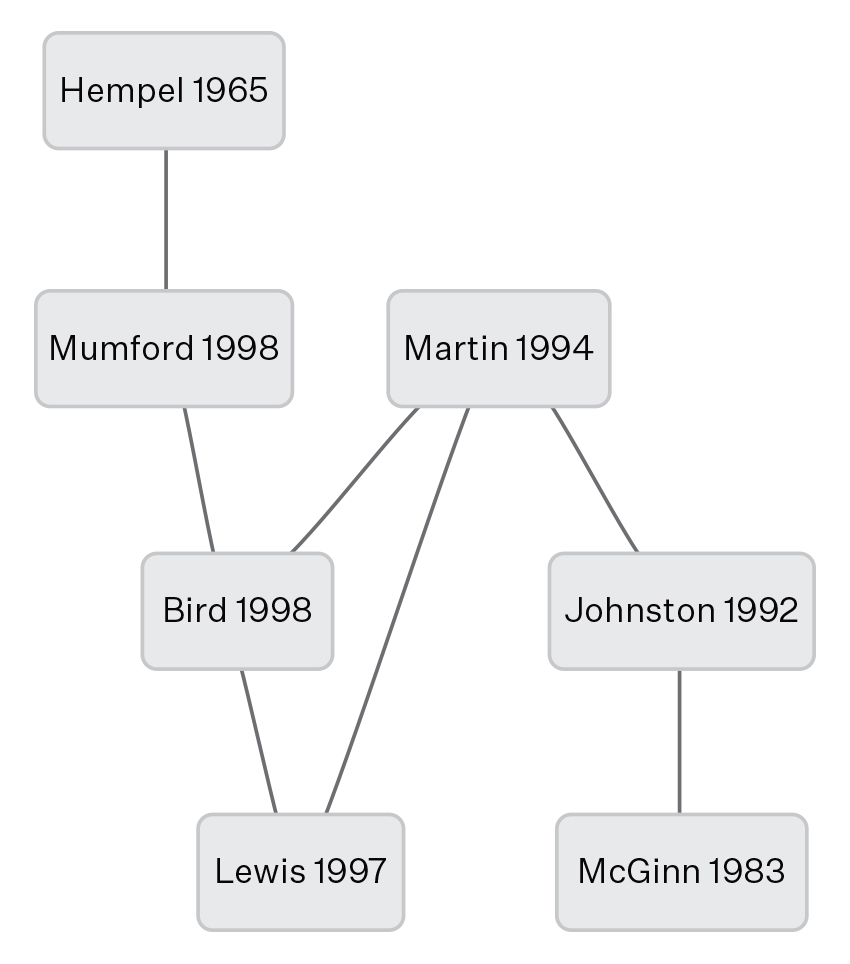EN PT/BR
Uma prévia de buscadores divergentes
Rodrigo Ochigame cria métodos mais críticos de indexação e busca de informações. Aqui ele compartilha uma prévia do trabalho em andamento sobre “buscadores divergentes”, que visa facilitar a exposição a perspectivas divergentes atravessando barreiras linguísticas e geográficas.
Consulta divergente: As consultas convencionais são geralmente monolíngues. As consultas divergentes usam lógica Booleana para combinar traduções automáticas de termos de pesquisa com termos selecionados em vários idiomas. A consulta a seguir busca textos discutindo “linguística” e “metáfora” que se relacionem com a teoria queer e estudos de gênero em alemão, espanhol, francês, japonês, português e russo.
Consulta normal
linguistics metaphor
Consulta divergente
(((Linguistik OR Sprachwissenschaft) AND Metapher)
AND (Queer OR Transgender OR Gender OR Geschlecht))
OR
((lingüística AND metáfora)
AND (queer OR cuir OR transgénero OR “estudios de género”))
OR
((linguistique AND métaphore)
AND (queer OR transgenre OR “études de genre”))
OR
((言語学 AND (比喩 OR メタファー OR 隠喩 OR 暗喩 OR 象徴))
AND クィア)
OR
((linguística AND metáfora)
AND (queer OR cuir OR transgênero OR “estudos de gênero”))
OR
(((языкозна́ние OR лингви́стика) AND мета́фора)
AND (Гендерные OR LGBT))
Embaralhamento divergente: As principais ferramentas de busca tendem a promover resultados que são populares e similares entre si. Embaralhamento divergente é um método que consiste em reordenar os resultados da pesquisa para melhorar a visibilidade de perspectivas divergentes. A lista a seguir contém textos discutindo “mudanças climáticas” que aparecem em periódicos de estudos da ciência da América do Norte e Europa Ocidental, América Latina, Leste Europeu e Ásia. A lista é embaralhada para garantir que os principais resultados representem uma mistura diversificada de regiões.
Ordem original
- Andrew S. Mathews, “Scandals, Audits, and Fictions: Linking Climate Change to Mexican Forests,” Social Studies of Science 44, no. 1 (2014): 82-108.
- M. L. Martello, “Arctic Indigenous Peoples as Representations and Representatives of Climate Change,” Social Studies of Science 38, no. 3 (2008): 351-376.
- Steven Yearley, “Book Review: Human Choice and Climate Change,” Science, Technology, & Human Values 24, no. 4 (1999): 501-502.
- Nick Lee and Johanna Motzkau, “Varieties of Biosocial Imagination: Reframing Responses to Climate Change and Antibiotic Resistance,” Science, Technology, & Human Values 38, no. 4 (2013): 447-469.
- Shana Lee Hirsch and Jerrold Long, “Adaptive Epistemologies: Conceptualizing Adaptation to Climate Change in Environmental Science,” Science Technology, & Human Values, 2020.
- Casper Bruun Jensen, “Wound-up Worlds and The Wind-up Girl: On the Anthropology of Climate Change and Climate Fiction,” Tapuya: Latin American Science, Technology and Society 1, no. 1 (2018): 186-200.
- Simon Shackley and Brian Wynne, “Representing Uncertainty in Global Climate Change Science and Policy: Boundary-Ordering Devices and Authority,” Science, Technology, & Human Values. 21, no. 3 (1996): 275.
- David M. Hart and David G. Victor, “Scientific Elites and the Making of US Policy for Climate Change Research, 1957-74,” Social Studies of Science 23, no. 4 (1993): 643-680.
- Jessica O’Reilly, Naomi Oreskes, and Michael Oppenheimer, “The Rapid Disintegration of Projections: The West Antarctic Ice Sheet and the Intergovernmental Panel on Climate Change,” Social Studies of Science 42, no. 5 (2012): 709-31.
- Mark Vardy, “Relational Agility: Visualizing near-Real-Time Arctic Sea Ice Data as a Proxy for Climate Change,” Social Studies of Science, 2020.
Divergent shuffle
- Casper Bruun Jensen, “Wound-up Worlds and The Wind-up Girl: On the Anthropology of Climate Change and Climate Fiction,” Tapuya: Latin American Science, Technology and Society 1, no. 1 (2018): 186-200.
- Марина Лоскутова, “«Влияние лесов на обмеление рек есть только недоказанная ипотеза»: прикладная наука и государственная политика по управлению лесным хозяйством Российской империи второй четверти XIX в,” Историко-биологические исследования 4, no. 1 (2012): 9-32.
- Bishwanath Golder, “Energy Intensity of Indian Manufacturing Firms Effect of Energy Prices, Technology and Firm Characteristics,” Science, Technology and Society 16, no. 3 (2011): 351-372.
- Andrew S. Mathews, “Scandals, Audits, and Fictions: Linking Climate Change to Mexican Forests,” Social Studies of Science 44, no. 1 (2014): 82-108.
- Nupur Chowdhury, “Role of the Indian Supreme Court in Shaping Technology Development,” Science, Technology and Society 19, no. 1 (2014): 57-77.
- David Moon, “Уничтожение лесов в степных районах, 1760-1914,” Историко-биологические исследования 2, no. 4 (2010): 51-65.
- Augusto Tolentino Camargo, André Felipe Simões, and Sérgio Almeida Pacca, “O potencial de mitigação da mudança climática dos vetores energéticos da cana-de-açúcar na frota paulistana de veículos leves”, Revista Tecnologia e Sociedade 15, no. 37 (2019).
- M. L. Martello, “Arctic Indigenous Peoples as Representations and Representatives of Climate Change,” Social Studies of Science 38, no. 3 (2008): 351-376.
- Govert Gijsbers and Rob Van Tulder, “New Asian Challenges Missing Linkages in Asian Agricultural Innovation and the Role of Public Research Organisations in Four Small- and Medium-Sized Asian Countries,” Science, Technology and Society 16, no. 1 (2011): 29-51.
- “Hambre, alta tecnología y desigualdad social: Un desafío a inicios del siglo XXI,” Revista Iberoamericana de Ciencia, Tecnología y Sociedad 5, no. 14 (2010): 177-201.
Rede divergente. Os métodos de pesquisa tradicionais geralmente são baseados na análise de rede de citações. As redes divergentes são compostas não por citações, mas por relações interpretativas que indicam perspectivas divergentes, como críticas e reanálises. A rede a seguir serve como um mapa das relações interpretativas entre textos da antropologia sociocultural. Por exemplo, a “Cosmopolítica indígena nos Andes”, de Marisol de la Cadena, oferece uma extensão do conceito de “constituição moderna” em Jamais fomos modernos, de Bruno Latour.
Rede de cocitações

Rede divergente
